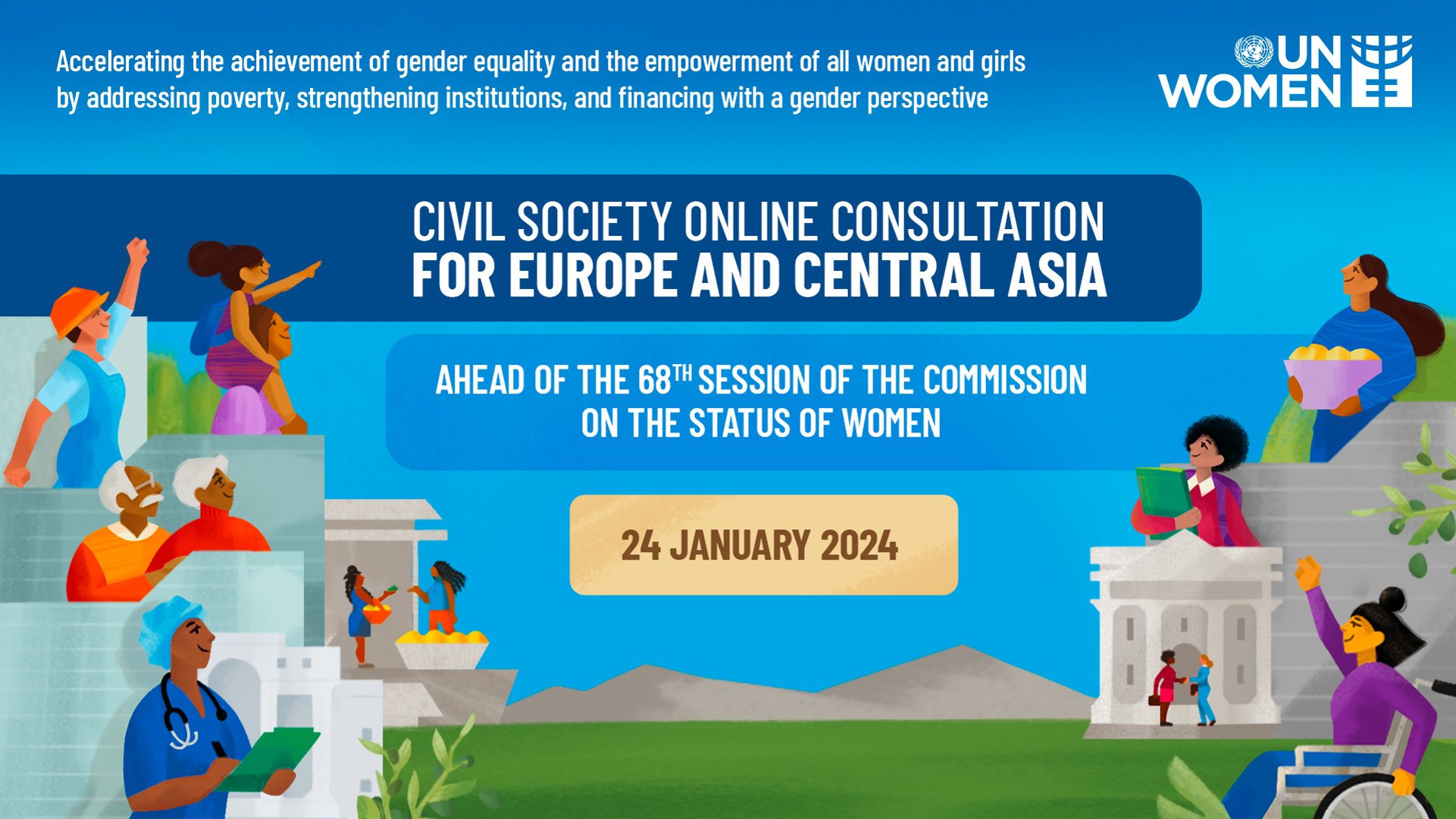Civil society from Europe and Central Asia unites to shape a collective statement for the 68th Commission on the Status of Women
Date:
[Press release]

Representatives from civil society organizations (CSOs) across Europe and Central Asia (ECA) convened to contribute to the gender equality agenda, actively participating in the development of a robust civil society position statement leading up to the 68th session of the Commission on the Status of Women (CSW68), scheduled from March 11-22, 2024.
Organized by the UN Women Regional Office for Europe and Central Asia, over 150 civil society representatives gathered in a secure space to exchange perspectives and provide recommendations on advancing the gender equality and empowerment agenda for all women and girls in preparation for CSW68, themed "Accelerating the achievement of gender equality and the empowerment of all women and girls by addressing poverty, strengthening institutions, and financing with a gender perspective."
In her opening remarks, Elisa Fernandez, Deputy Regional Director of UN Women Europe and Central Asia, emphasized the significance of the CSW as the principal global intergovernmental body exclusively dedicated to promoting gender equality. She called upon the expertise and deep understanding of the region from the participants to delve into the CSW68 theme.
"Today’s discussion will inform a civil society position paper that we will disseminate ahead, during, and beyond this year’s CSW. Your recommendations will meaningfully impact CSW68 discussions, bringing forth the unique experiences and insights of our ECA region," stated Elisa Fernandez.
The participants were organized into four thematic groups: I) Embracing Intersectionality in Addressing Poverty, Strengthening Institutions, and Financing with a Gender Perspective; II) Bridging Financing Gaps for Gender Equality and Women’s Empowerment: Building Capacities and Spaces to Influence Policies and Budgets for Gender Equality; III) Tackling Disproportional Burden and Unpaid Domestic and Care Work: Shifting Towards Care Economies; IV) Social protection systems and services and the role of civil society.
In the results, group one emphasized the need for additional pressure on governments to include civil society organizations from all sectors in decision-making processes, emphasizing the centrality of intersectionality.
“Governments need to be held accountable for the implementation of their international commitments. To do so, data and gender-disaggregated data are needed and must be strengthened. We need to know who is responsible for gender equality policies within our governments, and we call for more transparency,” affirmed Berfu Şeker, advocacy coordinator, Women for Women's Human Rights, Türkiye.
Representatives from group two reiterated the continued need for flexible funding for women’s rights organizations, emphasizing clear and transparent targets and the necessity to streamline administrative procedures for funding access.
“The CSW needs to set clear targets for core support and flexible, sustainable, and feminist funding for women’s rights organisations [and] to hold both multilaterals and governments accountable to implementing gender-responsive budgeting,” argued Nicole Farnsworth, Program Director and Lead Researcher, at Kosovo Women's Network.
“At the government level, there is a need to transition from a gender perspective to an intersectional feminist-inclusive approach concerning the care economy,” reiterated Almudena Rodriguez, Advocacy Coordinator, L’ Associació de Drets Sexuals i Reproductius, from Spain.
In addition, Xeniya Udod, Executive Director of the Central Asian Feminist Organization FemAgora, said: “We call on international organizations, governments, donors, and philanthropies to introduce and implement the principles of flexible, feminist funding that will contribute to the sustainability and resilience of civil society organizations and service providers in our region and beyond.”
Group three pointed out that patriarchal norms play a significant role in maintaining the burden of care on women, stressing the high cost of care work and the expectations on mothers to stay at home. They highlighted the lack of data on the pay gap and the gap left by unpaid care work with an intersectional lens.
Ultimately, the fourth group emphasized the absence of gender-sensitive standards concerning social protection in the region. They observed that social protection primarily centers on safeguarding families, rather than addressing individual needs or providing sustained support to women. ”In many of our countries, while the Istanbul Convention has been ratified, effective implementation is still pending. Furthermore, within social protection systems, the weight of responsibilities falls disproportionately on women, who form the majority of social workers," highlighted Anna Hovhannisyan, Advocacy Officer, Women’s Resource Center from Armenia.
It was also reiterated that financing of gender issues and social protection systems must include disaster readiness and emergency action plans.
A joint CSOs outcome document was drafted to bolster civil society advocacy efforts at local, national, regional, and global levels ahead and during the 68th session of the Commission on Status of Women. This document will also serve as an advocacy instrument, ensuring that the Agreed Conclusions of the Commission on the Status of Women are effectively translated into actions for advancing gender equality and women’s rights in the ECA region.